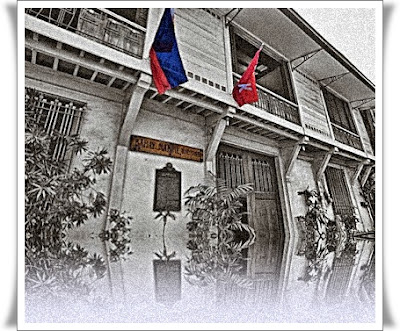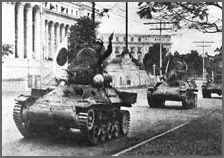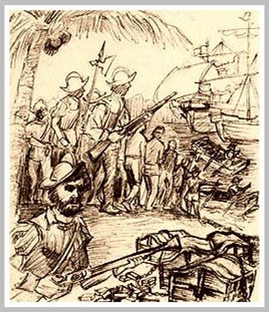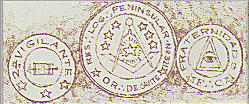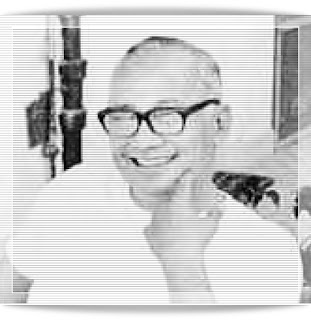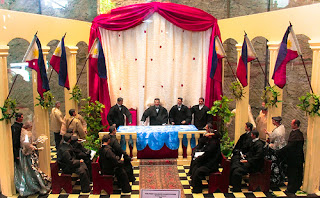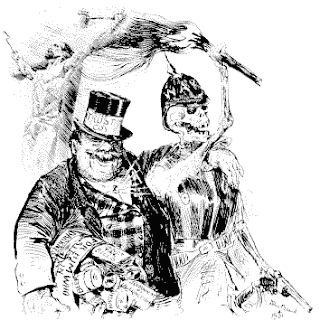 |
| Librada M. Avelino |
1873- Librada Avelino y Mangali, future Filipino educator and co-founder of Centro Escolar University, is born in Pandacan Manila
during the Spanish colonial period; when the successful flames of the
Philippine Revolution against Spain is quickly snuffed out by the
imperialist United States of America, Avelino will found a private
school that will not prosper because of the developing hegemony of the
newly imposed English language of the Bald Eagle nation; Avelino will cross the language barrier
by learning the colonial American language at a school designed by the
North American invaders for Spanish-trained Filipino teachers; along
with Carmen de Luna and Fernando Salas, Avelino will establish the Centro Escolar de Senoritas
that will later be known as the Centro Escolar University; a future
recipient of Master of Pedagogy, honoris causa, University of the
Philippines, Avelino will be noted for her defiant retort to her
American history teacher, Prescott F. Jernegan, who will claim that Gen.
Emilio F. Aguinaldo is the Cavite bandit chieftain, as follows: “Mr.
Jernegan, Aguinaldo was not a bandit chieftain. Our revolutionists were not bandits. They were patriots just like the Americans who revolted against England in 1776.”
 1901 - Emilio F. Aguinaldo, Philippine President on-the-guerrilla-run, issues a manifesto condemning
the atrocities committed by the forces of the imperialist Bald Eagle
nation nearly two years into the bloody and protracted Filipino-American War (1899-1914);
the manifesto comes some two months before Aguinaldo would be
traitorously captured by the enemy Americans with help from Macabebe
scouts; Aguinaldo, who earlier stupidly allowed the free entry of
American soldiers in the Southeast Asian archipelago in the belief
that the United States was Filipinos' ally against colonial Spain,
particularly condemned the barbaric execution style of the imperialist
Americans, to wit:
1901 - Emilio F. Aguinaldo, Philippine President on-the-guerrilla-run, issues a manifesto condemning
the atrocities committed by the forces of the imperialist Bald Eagle
nation nearly two years into the bloody and protracted Filipino-American War (1899-1914);
the manifesto comes some two months before Aguinaldo would be
traitorously captured by the enemy Americans with help from Macabebe
scouts; Aguinaldo, who earlier stupidly allowed the free entry of
American soldiers in the Southeast Asian archipelago in the belief
that the United States was Filipinos' ally against colonial Spain,
particularly condemned the barbaric execution style of the imperialist
Americans, to wit:
The heart-breaking sighs of the oppressed and of their families,
and the energetic protests of all the Filipino people reach me in my
distant camp, because of the unequalled cruelties and the cynical
violations of the most elemental laws of war perpetrated by the
imperialists, who, on the pretext that the unfortunate victims have
killed an American, hang the prisoners of war in a way which is
repugnant to humanity, the agony lasting fifteen minutes, according to
the Manila press which is under censorship; or else inflict upon them
unheard-of tortures, according to the testimony of my commanding
generals; and as if all these were not enough, the military governor
of the invading, out of the jurisdiction of the law, not only the
Filipinos who are in arms protest, but also the peaceful non-
combatants, who are made prisoners or deported without being tried,
almost always with no other purpose than to ransack their houses and
treasures, or to hope for indemnity or bribe for their freedom.
Photo credits:
http://www.collectibles-articles.com/antique/Philippine-American-War-EXECUTION-Hanging-Bilibid-priso_330508238144.html
http://dreamcatcherrye.blogspot.com/2010/03/leading-filipino-women_236.html

 1946 - Maria Paz Mendoza-Guazon, Filipina suffragist, doctor, educator, scientist, writer, social reformer, feminist, philanthropist and civic leader, is appointed the first female member of the Board of Regents of the University of the Philippines, the university established by the colonial United States government in 1908, mid-way into the protracted and bloody Philippine-American War (1899-1914); Mendoza-Guazon is also the first Filipina to acquire a high school diploma, the first woman graduate of the UP College of Medicine (1912), and first woman to receive the degree of Doctor of Tropical Medicine; in the 1920s, Mendoza-Guazon also figured in the 1920s struggle for women's suffrage during the American colonial period.
1946 - Maria Paz Mendoza-Guazon, Filipina suffragist, doctor, educator, scientist, writer, social reformer, feminist, philanthropist and civic leader, is appointed the first female member of the Board of Regents of the University of the Philippines, the university established by the colonial United States government in 1908, mid-way into the protracted and bloody Philippine-American War (1899-1914); Mendoza-Guazon is also the first Filipina to acquire a high school diploma, the first woman graduate of the UP College of Medicine (1912), and first woman to receive the degree of Doctor of Tropical Medicine; in the 1920s, Mendoza-Guazon also figured in the 1920s struggle for women's suffrage during the American colonial period.

